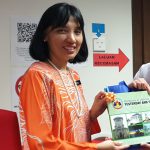As we live through these truly unprecedented times, it’s difficult to find any aspect of our lives that have not been impacted in one way or another. For example, we often take attending physical classes in university for granted, yet the emergence of COVID-19 has forced us to think otherwise. Being students from the Foundation in Science (FiS) programme at the International Medical University (IMU), my friends and I too were caught totally off guard when the pandemic swept throughout the world and the government of Malaysia implemented the Movement Control Order (MCO). Looking back to the day we were in campus just before the MCO period started, I could recall vividly the fears, anxieties and worries we all shared together. We were just two weeks into our final semester when the MCO was announced. Questions like “How long will this last?” and “What is going to happen to our classes?” ran through our minds as we frantically packed our belongings to return to our own homes. At that point, I would say that many of us were expecting it to only be a short two-week break before things would go back to normal. However, little did we know that it would soon turn into a semester-long journey of adapting to the new norm for all of us.
| Learning During MCO |
|---|
| As the dust began to settle, the reality of having to participate in online classes on a long-term basis dawned upon us. In all honesty, even with well-thought out contingency plans, everyone including the university management, lecturers and students still had a lot of questions running in each other’s minds. Virtual learning has always been touted as the future of education, but having to suddenly make the leap from a conventional classroom environment to learning using video calls in a week is definitely no easy feat. Nevertheless, I remember witnessing the lecturers and management sparing no effort in trying to set up a working system for online learning in the shortest span of time possible. As lecturers began recording new voice over lectures, our parents too played their part by purchasing the necessary laptops and tablets to ensure that we would be ready for online classes. As students, my classmates and I also had to undergo a lot of adjustments: being discipline enough to stick to the scheduled timetable, trying our best to stay awake after hours of staring at the laptop for online classes, trying to listen to our lecturers in the midst of background noise, trying to decipher what you have missed out due to bad internet connection and having to voice out our opinions / present while looking at a laptop instead of looking at our lecturer and each other. We could no longer meet to study together at the library, spend time relaxing at the Student Lounge or even have a meal together at the cafeteria or the mamak. It was truly an interesting yet challenging time for all of us. |

Slowly as time went by, logging into Microsoft Teams for our online classes became a daily affair for us. The boundaries between university and home blurred for us as our living rooms slowly turned into our classrooms. From listening to pre-recorded lectures to discussing tutorial questions, everyone tried their best to make online learning a truly workable reality. “Alright class, please remember to sign your attendance before we start our class today.” It would be nothing out of the usual to hear one’s lecturer to mention that, yet it was such a novel experience for us as we clicked into a poll to mark our attendance for our first ever online lecture. With our earphones plugged in and our eyes glued to our screens, the new norm began for us. Nevertheless, one would probably be incorrect to assume that the journey towards online learning haven’t been full of ups and downs. The question that kept on coming up on everyone’s mind was “How do we ensure that our students’ learning is disrupted as minimally as possible?” Under these circumstances, what mattered the most was an effective two-way communication between the lecturers and the students. Honest feedback and constructive criticisms were vital to truly address the challenges faced by all parties. I would always remember the weekly meetings we class representatives had with our Head of Centre of Pre-University and Programme Director over the concerns that we all shared. In those meetings, everyone exchanged their views openly and we students could witness first-hand their sincerity in tackling the issues that had arose. A great example of this would be settling for a combination of pre-recorded lectures, live QnA and tutorial sessions as the main method of learning for us. This combination ensured that our classes would not be too time consuming yet simultaneously ensuring that students had ample opportunities to enquire about any difficult topics.
Another intriguing experience we also had was having to deal with the newfound shyness everyone had about voicing up during online classes. I could remember vividly how one of my lecturers came up with a unique solution by inserting our names into a virtual lucky draw wheel. Whichever student who got chosen would then have to answer the question being discussed. This hilarious yet ingenious solution brought some much needed humour and excitement to the class while ensuring that all students could engage actively during lessons.
From online lab practical sessions to online examinations, all of us eventually grew accustomed to the new norm. Of course, everyone has their own opinions on online examinations, such as whether it is truly an effective platform to assess one’s understanding considering that it is usually an open-book examination. Nevertheless, I would definitely commend my lecturers and the university management for the steps they took to ensure that the exams remained as fair, effective and equal as possible. We could see the lecturers putting in their effort by setting more application-based questions to better test our understanding in a particular topic. Moreover, in every online assessment we sat for, I was grateful to have the lecturers and a team from the E-Learning Department to be online for the entire duration of the assessment. This definitely gave us a much-needed sense of reassurance as we knew that any technical issues faced during our examinations would be dealt with immediately. The extra consideration given to students who had slower internet speeds also helped ensure that no one would be disadvantaged in their grades due to their background.  Academic studies aside, one of our most memorable moments during this entire online learning process would be the online orientation session with our juniors. Having to ditch our plans for a face-to-face orientation, we had to think out of the box on how best to connect with our juniors without being physically together. In the end, we organized an online bonding session where we just chatted with each other while playing online games such as Skribbl.io and Spyfall. Such experiences reminded us that one could definitely still have fun and bond with each other despite the physical distances that lie between us.
Academic studies aside, one of our most memorable moments during this entire online learning process would be the online orientation session with our juniors. Having to ditch our plans for a face-to-face orientation, we had to think out of the box on how best to connect with our juniors without being physically together. In the end, we organized an online bonding session where we just chatted with each other while playing online games such as Skribbl.io and Spyfall. Such experiences reminded us that one could definitely still have fun and bond with each other despite the physical distances that lie between us.  All in all, it was definitely wonderful to see everyone go the extra mile in order to adapt to the new norm of online learning. However, looking retrospectively, my friends and I were truly fortunate to have been able to complete our semester on time and without the loss of any lessons. If there’s one thing that we could take away from this, it would be that when faced with insurmountable challenges, we should always be willing to experiment with new methods and be open to feedback in the process of doing so. As long as everyone is open to new ideas for improvement, quality and effective education can still be a reality even if it means doing it so virtually. Kudos to IMU for taking the necessary steps to ensure our online learning was as effective and smooth sailing as possible!
All in all, it was definitely wonderful to see everyone go the extra mile in order to adapt to the new norm of online learning. However, looking retrospectively, my friends and I were truly fortunate to have been able to complete our semester on time and without the loss of any lessons. If there’s one thing that we could take away from this, it would be that when faced with insurmountable challenges, we should always be willing to experiment with new methods and be open to feedback in the process of doing so. As long as everyone is open to new ideas for improvement, quality and effective education can still be a reality even if it means doing it so virtually. Kudos to IMU for taking the necessary steps to ensure our online learning was as effective and smooth sailing as possible!
Written by Samuel Chau Jun Hao









